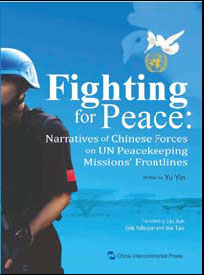Peace at a price
Updated: 2011-02-18 10:38
By Liu Zhihua (China Daily European Weekly)
 |
"In the past, Chinese went to a foreign land to get an education or to make a living, but peacekeeping forces are different. They are there to help foreigners," Yu says.
Lian holds a master's degree from Michigan State University in the United States as a criminal law major in 1997 and worked at a county level public security bureau before he was selected for the mission in East Timor.
Impressing other UN police officers with his ability and integrity, Lian was made general supervisor, through open competition, four months after he arrived in East Timor.
"Lian is a good example of Chinese peacekeeping officers, whose stories are impressive and encouraging," Yu says.
By May 2010, China had sent 1,573 peacekeeping police to seven UN assignment areas, demonstrating the commitment of a major economy to the peace of international society.
With help from Lian, Yu interviewed nearly 30 Chinese peacekeeping police officers.
Wang Ran, one of the first three Chinese women officers in East Timor, shares her gruesome job experience in East Timor with the author.
East Timor was covered with mass graves everywhere. In rebuilding the country, locals often unearthed bodies whose identities were hard to verify.
Wang's major task was to conduct surveys of the missing population, including unidentified bodies. She and four colleagues worked more than 10 hours a day, visiting burial sites to take careful notes and track down relatives of the deceased.
When there were not enough helping hands, Wang and her colleagues had to dig up the bodies themselves.
The cadavers were often decomposed due to the tropical island country's high temperatures. After a day's work at the stinking graveyard, Wang felt nauseous at night. Their assignment forced them to spend the night in tents beside the graves.
"I finally got a taste of the Chinese idiom feng can lu su' - eating in wind and sleeping in dew," Wang says.
"We used to be looked down upon by foreign countries, but now peacekeepers have gained honor for our country," Yu says. "They fulfilled their tasks perfectly. They deserve salutes."
In April 2010, China Intercontinental Press approached Yu to translate his book on Chinese peacekeeping operations.
"China has made great contributions to world peace. We hope the world could understand the efforts of our peacekeeping police force," says Jing Xiaoming, director of the Books Business Development Department at China Intercontinental Press.
"I never dreamed of writing books for foreign readers," Yu says. "But it feels great to be able to introduce our peacekeeping force to the world."
E-paper

Sindberg leaves lasting legacy
China commemorates Danish hero's courage during Nanjing Massacres.
Crystal Clear
No more tears
Road to the Oscars
Specials

NPC & CPPCC sessions
Lawmakers and political advisers gather in Beijing to discuss major issues.

Sentimental journey
Prince William and Kate Middleton returned to the place where they met and fell in love.

Rent your own island
Zhejiang Province charts plans to lease coastal islands for private investments
